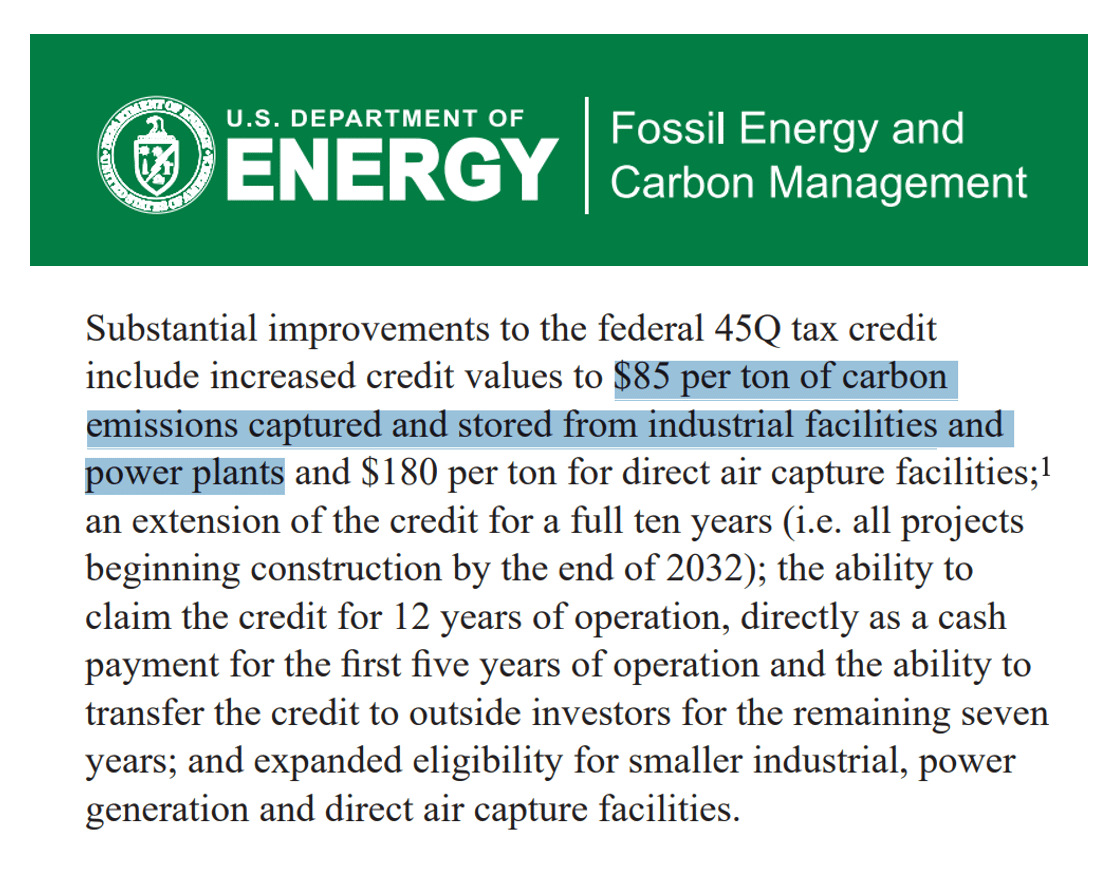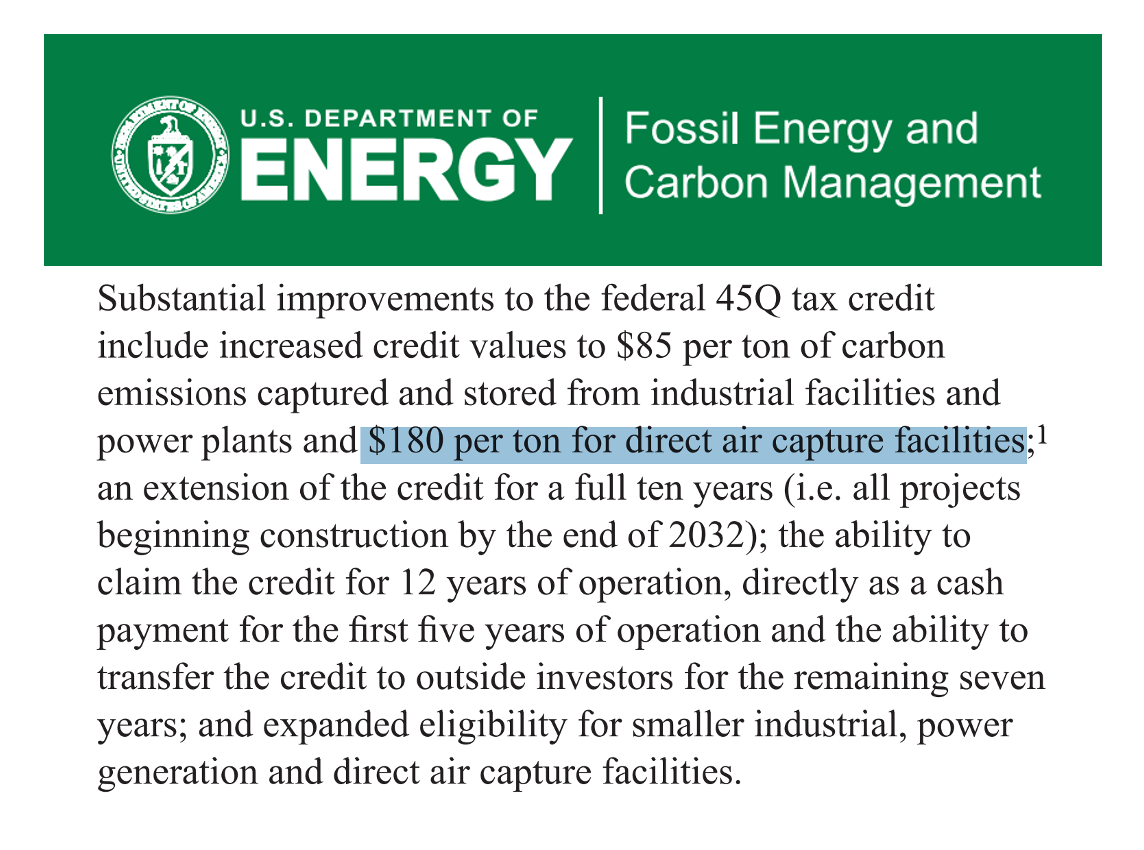Originally published: Apr 1, 2024
Q: What should the government do about carbon capture?
A: Government should eliminate all special preferences and all special punishments for carbon capture. This will allow innovators to explore the field’s potential for profitability and scalability—at no taxpayer expense.
-
Carbon capture involves capturing fossil fuels’ CO2 emissions directly (from exhaust) or indirectly (from the air).
It has garnered interest as a way of utilizing low-cost, reliable, versatile fossil fuel energy without the climate impacts.
-
Carbon capture has been extremely divisive for fossil fuel advocates.
Carbon capture supporters say they're ensuring that much-needed fossil fuels can exist in today's anti-CO2 political climate.
Opponents say supporting carbon capture is conceding climate catastrophism and making fossil fuels a subsidized industry.
-
Pro-fossil-fuel opponents of carbon capture are right that much support for carbon capture ends up conceding climate catastrophism—and that this is a mistake.
Fossil fuels supporters need to refute catastrophism, above all by arguing that fossil fuels make us safer than ever from climate via climate mastery.
“What should government do to address climate change?” -
Not only should we reject climate catastrophism when considering carbon capture, we should also reject the idea that reducing CO2 emissions should be our energy focus. Our focus should be on rapidly expanding the availability of affordable energy to an energy-starved world.
-
Pro-fossil-fuel opponents of carbon capture are right that many fossil fuel industry supporters of carbon capture are starting to turn the fossil fuel industry into a subsidized industry. And subsidized industries often mislead us, as some companies do when they portray carbon capture as a panacea.
-
Carbon capture's viability requires that it be extremely cheap or even profitable at scale so that fossil fuels remain cheap to use.
Most forms of carbon capture today are so expensive that they make fossil fuels high-cost, and none are globally scalable.
-
Pro-fossil-fuel supporters of carbon capture are right that in an anti-CO2 political environment, fossil fuels + carbon capture should not be discriminated against.
And they're right that the more companies improve carbon capture, the less damage anti-CO2 policies will do because we'll be able to use more fossil fuels.
-
The valid concerns of both opponents and supporters of carbon capture can be addressed by a pro-freedom carbon capture policy—–one that facilitates the exploration of low-cost and scalable forms of carbon capture vs. creating a subsidized, non-scalable industry that forces taxpayers to pay huge amounts of money.
-
Policy today improperly favors and punishes carbon capture. It favors carbon capture with huge subsidies (under the Inflation Reduction Act) while also punishing carbon capture by 1) excluding it from various CO2-reduction efforts and 2) waging a war on fossil fuels that makes fossil fuels + carbon capture more expensive.1
-
How big are carbon capture subsidies? The IRA’s $85/ton for CO2 emissions in exhaust might not seem like a lot. But in practice it means that a $30 ton of coal that generates 1.76 metric tons CO2 gets $150 in subsidy. The coal ends up costing $180 instead of $30: 6 times as much!2

-
The most costly version of carbon capture is "direct air capture," which is much harder than capturing CO2 from exhaust because CO2 in regular air is highly diluted (0.04% of the atmosphere). The IRA forces us to pay $180 per metric ton for this process.

-
Advocates of huge carbon capture subsidies claim that they will lead to an innovative industry that can cheaply capture CO2 globally.
But paying this much money indefinitely just encourages industry to utilize inefficient practices as long as the subsidy exists.
-
By coercing us into subsidizing carbon capture, government creates an industry that expands before it is low-cost and lowers incentives to become cheaper more quickly. The industry’s biggest incentive is to lobby to keep the subsidies, because they are the key to its success.
-
As much as our government favors carbon capture, it also punishes it. E.g., it often excludes fossil fuels + carbon capture from its many CO2-reduction efforts by, say, requiring grids to use "renewable" electricity to reduce CO2 emissions but not allowing fossil fuels + carbon capture. This makes no sense.
-
The biggest way in which carbon capture is punished is the government's war on fossil fuels that makes fossil fuels + carbon capture more expensive.
This includes government efforts to restrict fossil fuel investment, production, and transport, all of which increases the price of fossil fuels, including fossil fuels + carbon capture.3
-
If it weren’t for the war on fossil fuels, it is likely that the price of reliable electricity using coal or natural gas plus carbon capture would be significantly cheaper than the price of reliable electricity using solar and wind given their massive backup/life-support costs.
-
Advocates of punishing fossil fuels + carbon capture say that we should focus exclusively on “renewables” like solar and wind.
But these renewables have fundamental reliability problems, which leads to huge cost problems.
Any CO2 effort should be focused on cost-effectiveness and be tech-neutral.
-
The right policy toward carbon capture is:
-
Stop preferences by eliminating all carbon capture subsidies, along with all other energy subsidies—e.g., by the IRA.
-
Stop punishments by allowing carbon capture in all emissions reductions programs and above all by stopping the war on fossil fuels.
-
-
One misconception is that without government subsidies no one will explore carbon capture. But this is untrue because companies are already pursuing carbon capture to make profits—e.g., by using the captured CO2 to extract oil—or as part of their voluntary CO2 reduction efforts.4
-
An example of voluntary carbon capture is Stripe, which chooses to use some of its revenue to pay for (currently expensive) direct air capture. That kind of effort leads to exploring cheaper methods of capture, which would significantly reduce Stripe’s costs.5
-
If we stop giving carbon capture special preferences or punishments, then investors or innovators with genuinely good ideas will be able to pursue them on their own dime and we’ll make sure the cheapest low-carbon forms of energy (including fossil fuels + carbon capture) will be explored.
-
More broadly, any promise of fossil fuels + carbon capture and every other energy technology can be unleashed with a broad policy of liberating domestic development. This will unshackle energy from the many anti-development policies that make projects unnecessarily expensive.
Steffen Henne contributed to this piece.
References
- Clean Air Task Force - Carbon Capture and the Inflation Reduction Act↩
- Time Magazine - The Inflation Reduction Act Includes a Bonanza for the Carbon Capture Industry↩
- Alex Epstein - How a fake climate emergency created a real energy emergency↩
- U.S. National Energy Technology Laboratory - Commercial Carbon Dioxide Uses: Carbon Dioxide Enhanced Oil Recovery↩
- Stripe - Stripe Climate increases carbon removal commitments to $15 million, adding four new companies↩

